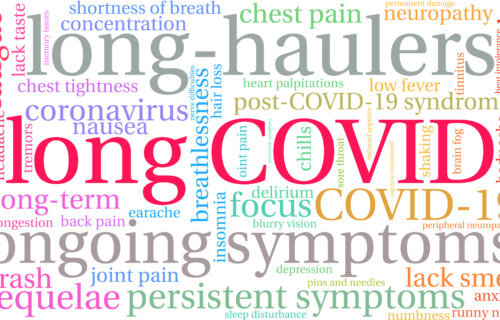CAMBRIDGE, England — A simple blood test for long COVID is on the horizon. Biological “fingerprints” can identify individuals with the debilitating syndrome, according to new research. This opens the door to the first accurate diagnosis of the mysterious condition. Sufferers complain it is hard to convince doctors of their disease.
Long COVID is an umbrella term for symptoms of the virus lasting more than 12 weeks. They range from fatigue, headaches, and breathlessness to fever and tummy pain. At least one fourth of patients have developed some form of long COVID, per research out of the University of California, Davis.
“We need a reliable and objective way of saying whether someone has had COVID-19,” says study co-leader Dr. Mark Wills of the University of Cambridge. “Antibodies are one sign we look for. But not everyone makes a very strong response and this can wane over time and become undetectable.”
The new technique is based on chemicals called cytokines that control blood cells. When released, the tiny proteins trigger the immune system’s T-cells to fight foreign invaders.
“We’ve identified a cytokine that is also produced in response to infection by T-cells and is likely to be detectable for several months — and potentially years — following infection,” adds Wills. “We believe this will help us develop a much more reliable diagnostic for those individuals who did not get a diagnosis at the time of infection.”
The discovery could revolutionize treatment by complementing existing antibody tests and identifying vulnerable individuals. It builds on a pilot study of 85 patients from the Long COVID Clinic at Addenbrooke’s Hospital in Cambridge. Blood samples were collected at the time of diagnosis and follow-up intervals over several months. Analyses identified a molecule known as a cytokine produced by T-cells in response to infection.
Like antibodies, the biomarker persists in the blood for a long time after infection. What’s more, a second type was found in patients with long COVID. It might even fuel the host of complaints. They also include muscle, joint- and chest pain, along with loss of smell or taste.
“Because we currently have no reliable way of diagnosing long COVID, the uncertainty can cause added stress to people who are experiencing potential symptoms,” explains study co-leader Dr. Nyarie Sithole, also from the Department of Medicine at Cambridge. “If we can say to them ‘yes, you have a biomarker and so you have long COVID’, we believe this will help allay some of their fears and anxieties.”
Patients generally feel abandoned and dismissed by healthcare providers and receive limited or conflicting advice. Between 27 and 33 percent of U.S. patients who had COVID-19, but did not need to be hospitalized later, developed some form of long-haul COVID, per UC Davis. About 33 percent of COVID-19 outpatients and 31 percent of hospitalized patients developed long-haul symptoms, according to research from the University of Washington.
A patient with asymptomatic or mild disease may not have taken a polymerase chain reaction (PCR) test, the gold standard for diagnosing COVID. Even antibody tests, which look for immune cells produced in response to infection, are estimated to miss almost one in three cases.
Dr. Wills and colleagues now plan to expand their cohort to 500 patients recruited from Cambridgeshire and Peterborough in England. By tracking them for up to 18 months post-infection, they hope to address several questions, such as if immunity wanes over time. This will shed light on whether those who have been vaccinated will need boosters to keep them protected.
“There’s anecdotal evidence patients see an improvement in symptoms of long COVID once they have been vaccinated — something we have seen in a small number of patients in our clinic. Our study will allow us to see how this biomarker changes over a longer period of time in response to vaccination,” says Dr. Sithole.
Increasing the number of participants and carrying out further work will enable the tests to be scaled and speeded up for clinical diagnosis. It may also show how the immune system responds to a coronavirus infection and why it triggers long COVID in some.
“One of the theories of what’s driving long COVID is it’s a hyperactive immune response. In other words, the immune system switches on at the initial infection and for some reason never switches off or never goes back to the baseline. As we’ll be following our patients for many months post-infection, we hope to better understand whether this is indeed the case,” says Dr. Sithole.
A reliable biomarker could also lead to the development of new treatments. Clinical trials require an objective measure. Changes in — or the disappearance of — long COVID-related cytokine biomarkers with corresponding symptom improvement would suggest a drug is working.
The team plans to publish study results shortly.
SWNS writer Mark Waghorn contributed to this report.
